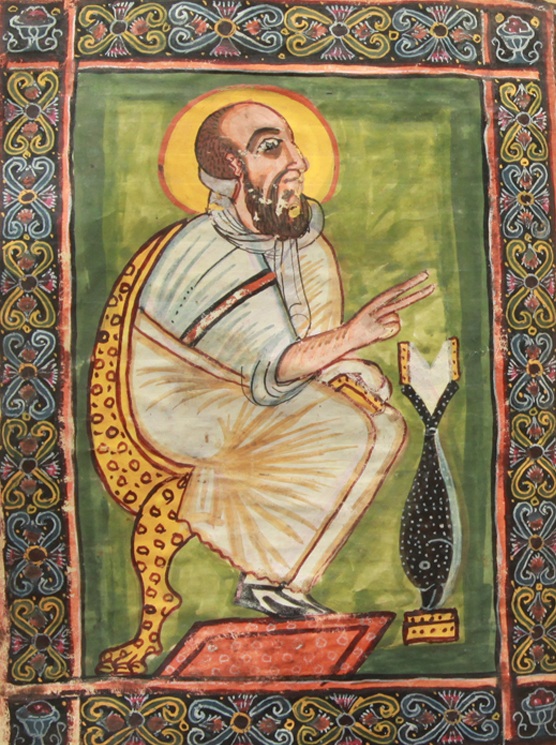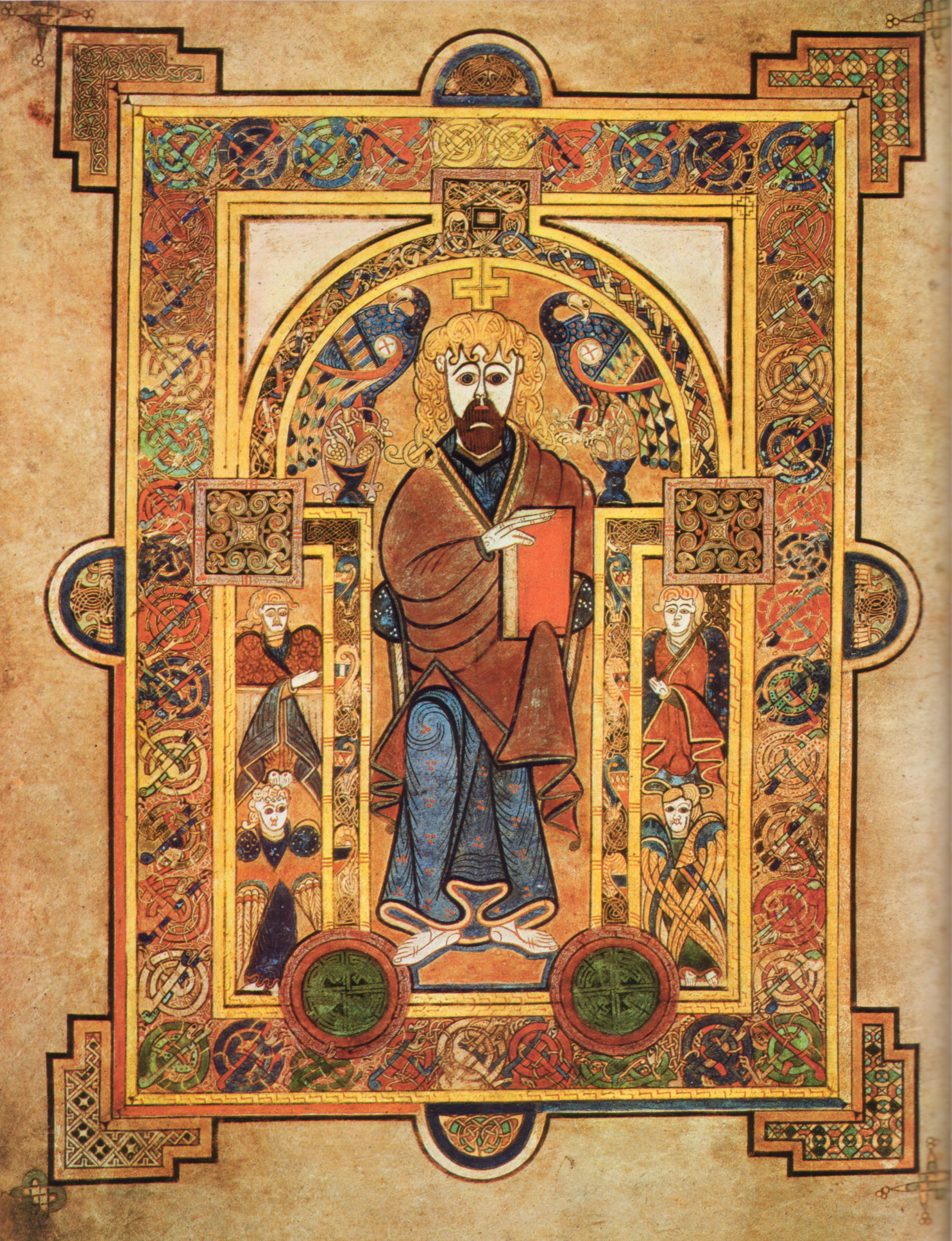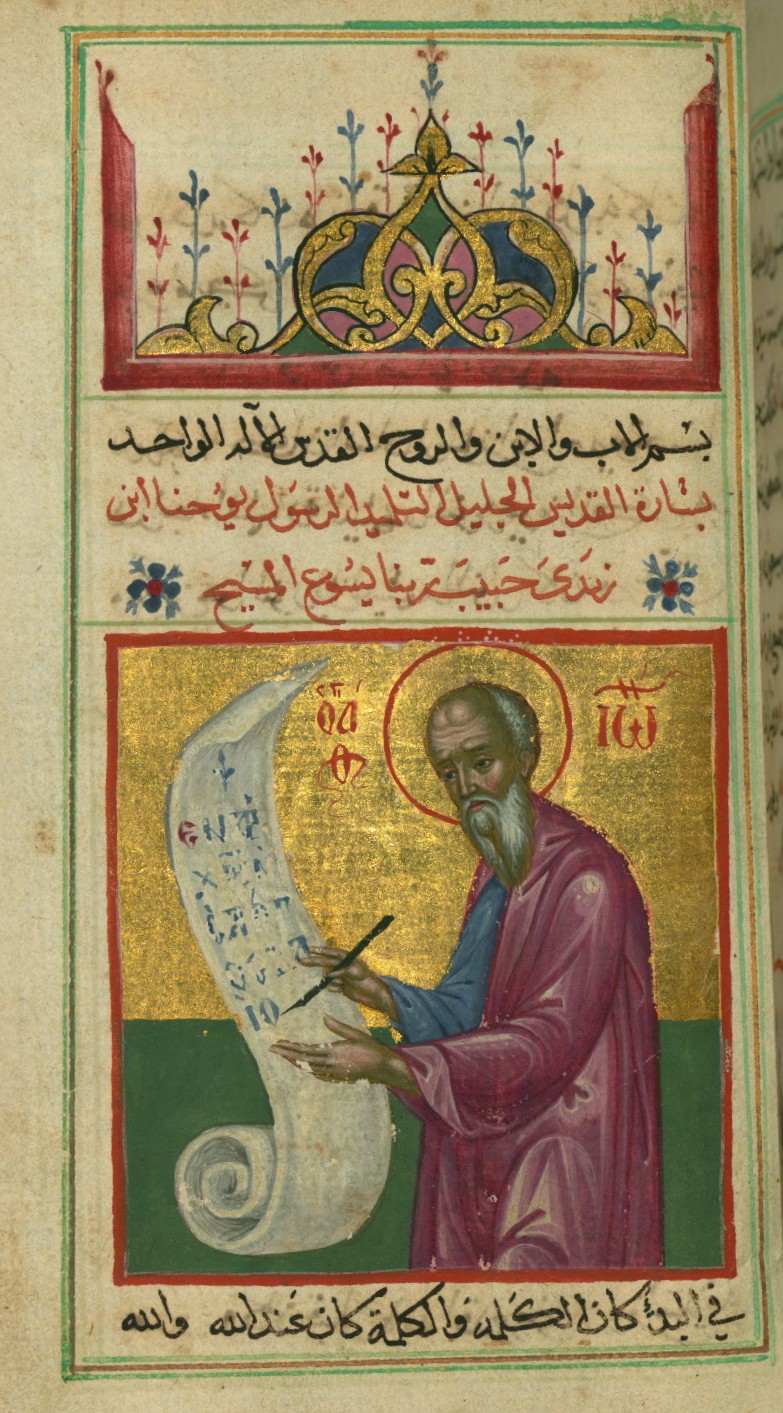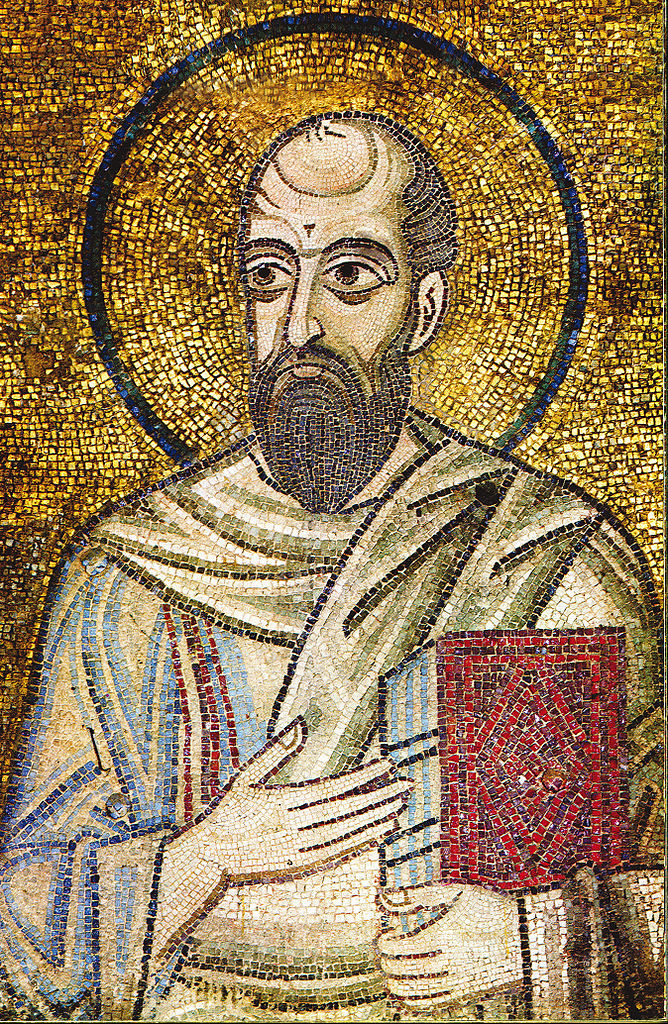Paul
Bible Studies, Messages, Papers
Photograph: The mosaic of Paul in St. Sophia, in Kiev, from 1000 AD. The oldest known depiction of the apostle Paul is from a painting in the Catacombs of St. Thecla in Rome in the 4th century. This mosaic portrays Paul in much the same way (see here). The military conflict between Kiev and Constantinople concluded when Kievan Princess Olga was baptized in 955 or 957, and her grandson Vladimir made Kiev a Christian state. Photo credit: Google Art Project | Public domain, Wikimedia Commons.
Bible Studies and Messages from The Anástasis Center: Paul:
Below are messages, small group leader notes, and exegetical notes on the writings of Paul.
Notes and Essays on Paul’s Writings
Paul's Letters and Christian Political Identity in the First Century World
Slides to a presentation depicting Jewish and Gentile political identities as a backdrop behind Paul’s ministry and his language of identity in Christ and union with Christ.
Paul's Language of Motivation: Our Union with Christ
An analysis of Paul’s motivational language as rooted in relational identity, or union with Christ. The contrast is to extrinsic and transactional forms of motivational language.
Paul's Terminology for the Human Person
Quotations from various scholars analyzing Paul’s terms for the human person and parts or modes of human existence: body, soul, spirit, mind, etc.
Slavery in Christianity, Part 1: Slavery in the Bible, Slavery Today
Research and slides which explores the Old Testament, then the New Testament. It looks at what the Hebrew "ebed" service meant in context, and then what Greek "duolos" meant and how the New Testament understood the various ways people could enter servitude. It uses a sociological approach, exploring different ways in to becoming an “ebed” or “duolos,” what rights and responsibilities those roles had, and how one could leave and/or escape.
Paul's View of Headship in Marriage: How 1 Corinthians Interprets Ephesians and Colossians
The word "head" (Greek kephale) was normatively defined by 1 Corinthians 11, where women preached, representing the head to the body. Therefore, people who have not had the experience of sitting under the authority of a female preacher-teacher have an incomplete understanding of headship, and probably an exclusively male understanding, which is defective. Also, the ethics of marriage taught in 1 Corinthians can be shown to take logical priority (not hermeneutical priority, except in a simplistic sense) over the ethics of marriage taught in Ephesians and Colossians.
A presentation given May 7, 2022 to the 2022 Reconstruction class, accompanying the video. Greek and Roman views of the inferiority of women began with Plato and Aristotle (4th century BC). But Pulcheria was a Christian woman who became Roman augusta in 414 AD and presided over the Third and Fourth Ecumenical Councils. Empress Theodora was very influential in the 500s. And Irene became Emperor of the Romans by 800 AD. How did this happen? This presentation explores vocation as the main category by which Christians empowered women in roles distinct from family, examining the Catacombs of Priscilla, Irenaeus of Lyons, The Acts of Paul and Thecla, the Martyrdom of Perpetua and Felicitas, Montanism and the orthodox reaction to it, Melania the Elder, Paula of Rome, Nino of Georgia, Brigit of Ireland. The presentation also discusses the disagreements between Irenaeus, Tertullian, and Origen about how to interpret women in 1 Corinthians 11. This presentation and the video are the second of the 2022 Reconstruction class topics on the early church. See also our YouTube channel Reconstruction playlist for all the videos.
Whose Family? Which Union? Reflections on Scripture, Human Sexuality and God's Purposes
A paper summarizing the five Letters to a Gay Friend. This is an exegetical and pastoral paper examining biblical passages that are important in the discussion about what God’s vision for human sexuality is: Genesis 1 - 2; Leviticus 18 and 20; Matthew 19; Romans 1; 1 Corinthians 6 - 7; 1 Timothy 1. Ultimately, we have to look at the the nature of human desire in general, as a gift from God to move us towards extending ourselves towards Him and others. However, we are called to submit our desires to Jesus, who demonstrated the normative human emotions and desires.
Slides of a presentation given December 11, 2021 to the Reconstruction 2021 class. This presentation is a deep dive into Romans 9 - 11 based on literary and biblical-intertextual exegesis, and patristic interpretation. Everyone but Augustine of Hippo believed that God granted and maintained human free will, because we are partners with God in shaping our own human nature. Romans 9 - 11 refers to God accomplishing His purposes in history, delivering Israel from Egypt and delivering Jesus from sin and mortality. Romans 9 - 11 does not refer to God accomplishing a “double predestination” into the realm of the eternal. Some consideration is given to Ephesians 1:1 - 14 and John 6.
Other Resources on Paul's Writings
Paul, Judaism & jesus
Michael F. Bird, Ambrosiaster on "Works of the Law" (Patheos, Sep 28, 2013) and summary of positions
Matthew J. Thomas, Paul’s “Works of the Law” in the Perspective of Second Century Reception (Amazon book, Aug 2018) and interview Matthew J. Thomas - Paul’s Works of the Law (OnScript, 2018) showing that the “New Perspective” on Paul is in fact the “Oldest Perspective” and is correct. The “works of the Law” are specifically Jewish observances like circumcision, Sabbath, and kosher diet. It does not mean “moral effort” of any type. Thomas shows how Luther and Calvin failed to find grounding for their views in the early church writings, which is fatal for them.
Scot McKnight, The New Perspective Is Earlier Than The Old Perspective (Patheos|Jesus Creed, Sep 24, 2018).
N.T. Wright, Faith: What Does Paul Mean? (N.T. Wright Online, Oct 7, 2019) a 5.5 minute video summarizing the “faith in” or “faithfulness of” Jesus debate; Wright lands on the “faithfulness of" Jesus interpretation and anchors that interpretation in Romans 3.
Matthew Halsted, What Does Paul Mean by “Works of the Law”? An Interview with Matthew J. Thomas (Matthew Halsted, Jan 14, 2021)
Paul & the Christ-centered Understanding of God
Gordon D. Fee, Paul, the Spirit, and the People of God (pdf book, 1996)
N.T. Wright, New Perspectives on Paul (N.T. Wright Page, Aug 2003)
N.T. Wright, Paul and the Faithfulness of God (video, Jan 13, 2014)
N.T. Wright, How Paul Invented Christian Theology (video, Apr 25, 2014)
Michael Thate, Kevin Vanhoozer, and Douglas Campbell, "In Christ" in Paul (pdf book, Dec 1, 2014)
N.T. Wright, If Creation is Through Christ, Evolution is What You'd Expect (BioLogos, Apr 24, 2017) short, excellent 4 minute reflection on Colossians 1 and Genesis 1
Paul & Christian Ethics
N.T. Wright, Gender and the Biblical Basis for Women's Service in the Church (video, 2004)
Dennis J. Preato, Empirical Data in Support of Egalitarian Marriages and A Fresh Perspective on Submission and Authority (God's Word to Women, Apr 23, 2004) note comments on Cyril, Theodore, and John Chrysostom and their engagement with 1 Corinthians and Ephesians based on an Athanasian view of the Trinity, where the Son is the power of the Father (1 Cor.1:24), rather than an Augustinian view of the Trinity, where the Son has power, but the Father has more
N.T. Wright, Paul's Gospel and Caesar's Empire (article, Sep 3, 2010)
David Instone-Brewer, Bible Scandals: Divorce (BeThinking, 2012) very important considerations for marital abuse cases
Scot McKnight, The Silence of Complementarians on Slavery (Patheos | Jesus Creed blog, Apr 25, 2016)
Liam Goligher, Is it Okay to Teach a Complementarianism Based on Eternal Subordination? (Mortification of Spin, Jun 3, 2016)
Liam Goligher, Reinventing God (Mortification of Spin, Jun 6, 2016)
Margaret Mowczko, The Household Codes Are About Power, Not Gender (Marg Mowczko blog, Feb 27, 2019)






































